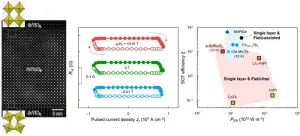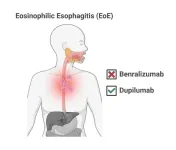(Press-News.org) Los Angeles, CA (June 27, 2024) —A new study published in the journal Nature Communications led by paleontologists at the University of Bristol along with a team of international researchers, including Dr. Austin Hendy, Curator of Invertebrate Paleontology at the Natural History Museum of Los Angeles County, finds that instead of fizzling out ahead of their extinction, ammonoids were still going strong across the globe in the Late Cretaceous. Made possible by museum collections, the new study compared their diversity across the globe just prior to extinction, unearthing the complex evolutionary history of their final chapter for the first time.
Ammonoids, marine mollusks often distinguished by their coiled shells, are one of paleontology’s great icons. They flourished in Earth’s oceans for more than 350 million years until their extinction during the same chance event that wiped out the dinosaurs 66 million years ago. Some paleontologists, however, have argued the diversity of ammonites (the last major lineage of ammonoids) was declining well before their extinction at the end of the Cretaceous Period and that their demise was inevitable.
“Ammonites had an amazing evolutionary history. With their formidable shells and powerful tentacles they innovated the act of swimming. They could grow to as big as a car or to just a few millimeters in diameter. They played equally disparate roles in their ecosystems, from predators near the top of the food web to filter feeding off plankton,” said Hendy.
“Understanding how and why biodiversity has changed through time is very challenging,” said lead author Dr. Joseph Flannery-Sutherland. “The fossil record tells us some of the story, but it is often an unreliable narrator. Patterns of diversity can just reflect patterns of sampling, essentially where and when we have found new fossil species, rather than actual biological history. Analyzing the existing Late Cretaceous ammonite fossil record as though it were the complete, global story is probably why previous researchers have thought they were in long-term ecological decline.”
To overcome this issue, the team assembled a new database of Late Cretaceous ammonite fossils to help fill in the sampling gaps in their record. “We drew on museum collections to provide new sources of specimens rather than just relying on what had already been published,” said co-author Cameron Crossan, a 2023 graduate of the University of Bristol’s Palaeobiology MSc program. “This way, we could be sure that we were getting a more accurate picture of their biodiversity prior to their total extinction.”
Using their database, the team then analyzed how ammonite speciation—forming distinct new species—and extinction rates varied in different parts of the globe. If ammonites were in decline through the Late Cretaceous, then their extinction rates would have been generally higher than their speciation rates wherever the team looked. Instead, the team found that the balance of speciation and extinction changed both through geological time and between different geographic regions.
“These differences in ammonoid diversification around the world is a crucial part of why their Late Cretaceous story has been misunderstood,” said senior author Dr. James Witts of the Natural History Museum, London. “Their fossil record in parts of North America is very well sampled, but if you looked at this alone, then you might think that they were struggling while they were actually flourishing in other regions. Their extinction really was a chance event and not an inevitable outcome.”
Environmental Factors vs Competition
So, what was responsible for the continued success of ammonites through the Late Cretaceous? To answer this question, the team looked at potential factors that might have caused their diversity to change over time. They were particularly interested in whether their speciation and extinction rates were driven mainly by environmental conditions like ocean temperature and sea level or by biological processes like pressure from predators and competition between ammonites.
“What we found was that the causes of ammonite speciation and extinction were as geographically varied as the rates themselves,” said co-author Dr. Corinne Myers of the University of New Mexico. “You couldn’t just look at their total fossil record and say that it was driven entirely by changing temperature, for example. It was more complex than that and depended on where in the world they were living.”
“Palaeontologists are frequently fans of silver bullet narratives for what drove changes in a group’s fossil diversity, but our work shows that things are not always so straightforward,” Dr. Flannery Sutherland concluded.
END
Ammonites went out with a diverse bang—and not a long, slow fizzle—in the Late Cretaceous
A new study used museum collections to map ammonite diversity around the globe before their total extinction and found they were not in decline prior to their extinction alongside non-avian dinosaurs 66 million years ago
2024-06-27
ELSE PRESS RELEASES FROM THIS DATE:
Cleveland Clinic launches wellness and diet coaching app featuring state-of-the-art food and fitness tracking, support and education
2024-06-27
Embargoed until 4am EDT Cleveland, OH (Thursday, June 27, 2024) – Cleveland Clinic and app developer FitNow, Inc. have launched the Cleveland Clinic Diet app, which offers health and diet advice built upon evidence-based nutrition science and clinical success, paired with a comprehensive food and fitness tracker.
The app provides individualized guided support with the input of Cleveland Clinic health experts to help users make sustainable changes to their lifestyle and dietary habits for better health and well-being.
“We know that health is about far more than just weight. ...
Light-controlled artificial maple seeds could monitor the environment even in hard-to-reach locations
2024-06-27
Researchers from Tampere University, Finland, and the University of Pittsburgh, USA, have developed a tiny robot replicating the aerial dance of falling maple seeds. In the future, this robot could be used for real-time environmental monitoring or delivery of small samples even in inaccessible terrain such as deserts, mountains or cliffs, or the open sea. This technology could be a game changer for fields such as search-and-rescue, endangered species studies, or infrastructure monitoring.
At Tampere University, Professor Hao Zeng and Doctoral Researcher Jianfeng Yang ...
Patients receiving protocol exceptions to participate in targeted therapy trial experienced similar outcomes as eligible participants
2024-06-27
Bottom Line: Patients with treatment-refractory cancers who received eligibility and testing waivers to participate in a large basket/umbrella oncology trial had similar rates of clinical benefit and adverse events as patients who participated in the trial without waivers.
Journal in Which the Study was Published: Clinical Cancer Research, a journal of the American Association for Cancer Research (AACR)
Author: Hans Gelderblom, MD, senior author of the study and chair of the Department of Medical Oncology at the Leiden University Medical Center in the Netherlands
Background: Eligibility requirements ...
Magic mushrooms are the most-used psychedelic drug
2024-06-27
Psilocybin mushrooms are the psychedelic substance most often used in the U.S., with its popularity outpacing other psychedelic drugs such as MDMA (known as ecstasy), according to a new RAND report.
Based on a new national survey, researchers found that about 12% of respondents reported using psilocybin at some point over their lives and 3.1% reported using the substance over the past year. An estimated 8 million American adults used psilocybin in 2023.
Psychedelic substances such as psilocybin mushrooms and MDMA long have been touted as holding promise for treating various mental ...
Diagnostic stewardship approach to C. diff reduces unnecessary testing
2024-06-27
Arlington, Va. — June 27, 2024 — A new study published today in the American Journal of Infection Control (AJIC) describes the outcome of a new approach to testing for Clostridioides difficile (C. diff) guided by the principles of diagnostic stewardship. At Memorial Healthcare System in Hollywood, Fla., revised rules for when C. diff tests could be ordered helped to reduce inappropriate testing by 20%, which in turn can help rein in the overtreatment of patients.
C. diff is a common and potentially dangerous gastrointestinal pathogen, often linked to healthcare-associated infections ...
Materials research revolutionized by a small change
2024-06-27
Like the flutter of a butterfly's wings, sometimes small and minute changes can lead to big and unexpected results and changes in our lives. Recently, a team of researchers at Pohang University of Science and Technology (POSTECH) made a very small change to develop a material called “spin-orbit torque (SOT),” which is a hot topic in next-generation DRAM memory.
This research team, led by Professor Daesu Lee and Yongjoo Jo, a PhD candidate, from the Department of Physics and Professor Si-Young ...
How scientists build rotatory machines with molecules
2024-06-27
Machines have evolved to meet the demands of daily life and industrial use, with molecular-scale devices often exhibiting improved functionalities and mechanical movements. However, mastering the control of mechanics within solid-state molecular structures remains a significant challenge.
Researchers at Ulsan National Institute of Science and Technology (UNIST), South Korea have made a groundbreaking discovery that could pave the way for revolutionary advancements in data storage and beyond. Led by Professor Wonyoung Choe in the Department of Chemistry at UNIST), a team of scientists has developed zeolitic imidazolate frameworks (ZIFs) that mimic intricate machines. These molecular-scale ...
Two studies show mixed progress against EoE
2024-06-27
Despite high hopes, a drug that wipes out the namesake cell type associated with the disease eosinophilic esophagitis (EoE) doesn’t make patients feel better and doesn’t reverse tissue damage in their throats.
Meanwhile, data show that a different drug that had previously been approved for use in adults and teens with EoE is also safe and effective for children under 12 who weigh at least 15 kg (about 33 pounds).
The results of these clinical trials—plus an accompanying editorial—appear in the June 17, 2024, edition of The New England Journal of Medicine.
“Together, these ...
Why the harsh Snowball Earth kick-started our earliest multicellular ancestors: new study
2024-06-27
For a billion years, single-celled eukaryotes ruled the planet. Then around 700 million years ago during Snowball Earth — a geologic era when glaciers may have stretched as far as the Equator — a new creature burst into existence: the multicellular organism.
Why did multicellularity arise? Solving that mystery may help pinpoint life on other planets and explain the vast diversity and complexity seen on Earth today, from sea sponges to redwoods to human society.
Common wisdom holds that oxygen levels had to hit a certain threshold ...
Bin Wang receives Friedrich Wilhelm Bessel Research Award
2024-06-27
NORMAN, OKLA. – Bin Wang, a professor in the School of Sustainable Chemical, Biological and Materials Engineering at the University of Oklahoma, has received a Friedrich Wilhelm Bessel Research Award from the Alexander von Humboldt Foundation. Wang was selected for his contributions to computational catalysis and physical chemistry.
The Bessel Award is funded by the German Federal Ministry of Education and Research to foster collaborative relationships between international academics and German researchers. The award ...
LAST 30 PRESS RELEASES:
Scientists show how to predict world’s deadly scorpion hotspots
ASU researchers to lead AAAS panel on water insecurity in the United States
ASU professor Anne Stone to present at AAAS Conference in Phoenix on ancient origins of modern disease
Proposals for exploring viruses and skin as the next experimental quantum frontiers share US$30,000 science award
ASU researchers showcase scalable tech solutions for older adults living alone with cognitive decline at AAAS 2026
Scientists identify smooth regional trends in fruit fly survival strategies
Antipathy toward snakes? Your parents likely talked you into that at an early age
Sylvester Cancer Tip Sheet for Feb. 2026
Online exposure to medical misinformation concentrated among older adults
Telehealth improves access to genetic services for adult survivors of childhood cancers
Outdated mortality benchmarks risk missing early signs of famine and delay recognizing mass starvation
Newly discovered bacterium converts carbon dioxide into chemicals using electricity
Flipping and reversing mini-proteins could improve disease treatment
Scientists reveal major hidden source of atmospheric nitrogen pollution in fragile lake basin
Biochar emerges as a powerful tool for soil carbon neutrality and climate mitigation
Tiny cell messengers show big promise for safer protein and gene delivery
AMS releases statement regarding the decision to rescind EPA’s 2009 Endangerment Finding
Parents’ alcohol and drug use influences their children’s consumption, research shows
Modular assembly of chiral nitrogen-bridged rings achieved by palladium-catalyzed diastereoselective and enantioselective cascade cyclization reactions
Promoting civic engagement
AMS Science Preview: Hurricane slowdown, school snow days
Deforestation in the Amazon raises the surface temperature by 3 °C during the dry season
Model more accurately maps the impact of frost on corn crops
How did humans develop sharp vision? Lab-grown retinas show likely answer
Sour grapes? Taste, experience of sour foods depends on individual consumer
At AAAS, professor Krystal Tsosie argues the future of science must be Indigenous-led
From the lab to the living room: Decoding Parkinson’s patients movements in the real world
Research advances in porous materials, as highlighted in the 2025 Nobel Prize in Chemistry
Sally C. Morton, executive vice president of ASU Knowledge Enterprise, presents a bold and practical framework for moving research from discovery to real-world impact
Biochemical parameters in patients with diabetic nephropathy versus individuals with diabetes alone, non-diabetic nephropathy, and healthy controls
[Press-News.org] Ammonites went out with a diverse bang—and not a long, slow fizzle—in the Late CretaceousA new study used museum collections to map ammonite diversity around the globe before their total extinction and found they were not in decline prior to their extinction alongside non-avian dinosaurs 66 million years ago








